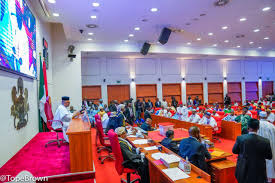By Onyewuchi Ojinnaka
The Socio-Economic Rights and Accountability Project (SERAP), a human rights and advocacy organization based in Lagos, Nigeria, has sent Freedom of Information requests to President Muhammadu Buhari, Vice-President Professor Yemi Osinbajo, 36 state governors and their deputies, urging them to use their good offices to provide information on summary of the assets, specifically property and income, contained in their asset declaration forms submitted to the Code of Conduct Bureau (CCB) since assumption of office.
SERAP is also asking them to clarify within 7 days of the receipt and/or publication of this letter, if they have had any reason to review and update the asset declarations submitted to the CCB, and to provide the summary of any such review; failing which, all appropriate legal action will be taken to compel them to comply with the request.
“The summary of assets to be disclosed include, where applicable, the following: savings and other liquid assets, all immovable property and shares and actions in any private and public companies; property purchased by way of tender from any public-law entities and information about businesses owned.” SERAP said.
In the FoI requests dated January 3, 2020 and signed by SERAP deputy director Kolawole Oluwadare, the organization stated that the Constitution of Nigeria 1999 (as amended), the FoI Act, and the African Charter on Human and Peoples’ Rights, which is part of our laws, read together, impose transparency obligations on all public officials to publicly disclose information concerning their asset declarations submitted to the CCB, and to clarify any updated review of such assets.
SERAP also said: “The non-public disclosure by public officials of their summary of assets seriously undermines the effectiveness and integrity of the constitutional and statutory obligations to submit asset declarations, especially given that declarations are designed to curb grand corruption. The non-disclosure of assets also undermines the authority of the CCB and weakens the public trust in the asset declaration regimes.”
In particular reference to the FoI request to President Buhari, SERAP noted his public promise to make specific details of his assets public, and urge him to consider this FoI request as a unique opportunity to fulfil the promise made to the Nigerian people.
Parts of the various FoI requests read: “Our FoI request does not clash with the rights to privacy and data protection. Both rights are not absolute and can be restricted provided there is a basis in law and a legitimate public interest justifies the restriction. Prevention of grand corruption and exposing unexplained wealth of officials are serious and legitimate public interests.”
“We would also like you to clarify if you have encouraged members of your cabinet to also submit their asset declarations to the CCB and to make such declarations public. If so, we would like you to provide information on the details of those that have made submissions.”
“We would also like you to clarify whether a declaration has been submitted as constitutionally and statutorily required, the date of any such submission, and if you have received any confirmation of the verification of your asset declaration by the CCB.”
“The general public has a legitimate interest in ascertaining and scrutinising the veracity, exactitude and honesty of information contained in asset declarations submitted by public officials to the CCB. Without public disclosure of summary of assets, this would have no practical importance.”
“Public disclosure of summary of assets submitted to the CCB would help uncover any irregularities and trigger formal verification of declarations by the CCB and other anti-corruption agencies.”
“The information requested is the summary of assets submitted to the CCB pursuant to constitutional and statutory provisions. Providing the information will meet the constitutional objective of giving the public a reasonable picture of your detailed asset declaration lodged with the CCB as well as serve the purpose of providing a safeguard against abuse of the asset declaration process.”
“This would in turn serve as an incentive to public officials to provide exact information when filing and submitting their asset declarations.”
“The advantages that the general public would gain from being informed about the summary of assets declaration submitted to the CCB outweigh any inconvenience that may occur if the information is disclosed, pursuant to our FoI request.”
“We believe that the Nigerian Constitution, the FoI Act and the African Charter grant the right to obtain information on the summary of assets of all public officials occupying a position of trust and discharging public functions.”
“Any perceived claim of interference with the right to privacy are sufficiently foreseeable for the purposes of the legal requirements for asset declarations by public officials, given that public-disclosure of summary of assets would undoubtedly contribute to the legitimate aim of asset declaration regimes to prevent corruption, as it would ensure transparency regarding the details of those assets.”
“SERAP notes that a decision to run for public office is an occasion when people knowingly or intentionally involve themselves in activities which are or may be recorded or reported in a public manner.”
“It is in the nature of the democratic political process that Nigerians may legitimately be interested in the conduct of public officials. The issue of the asset declarations of persons holding public offices is one of legitimate public interest and concern, and serves the purpose of ensuring transparency in the exercise of public functions.”
“By Section 1 (1) of the FoI Act, SERAP is entitled as of right to request for or gain access to information, including information on the summary of the asset declaration submitted to the CCB.”
“By Section 4 (a) of the FoI Act, when a person makes a request for information from a public official, institution or agency, the public official, institution or urgency to whom the application is directed is under a binding legal obligation to provide the applicant with the information requested for, except as otherwise provided by the Act, within 7 days after the application is received.”













